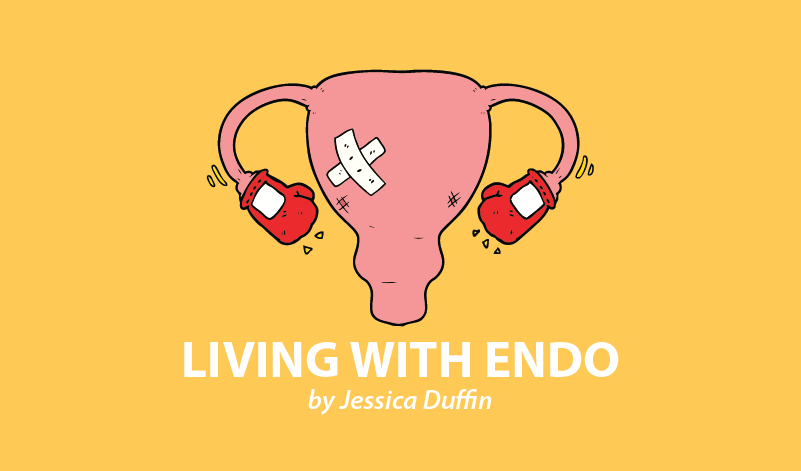I’ve always been an anxious person. When I was child, my experience with this was just labeled as being a worrier. Through my teenage years, as endometriosis symptoms crept in, the yo-yoing between depression, chronic pain, fatigue, and general ill-health kept me locked in a state of high anxiety.
Until I left my previous employer, my anxiety had gotten to a place where it felt out of control. In a way, I was a high-functioning (maybe just functioning, on reflection) anxiety sufferer, but I wasn’t coping. Every week, I’d have a meltdown at the dinner table, and I’d have huge panic attacks alone in the office and sit behind my computer so riddled with panic that I couldn’t even type a sentence. That fear and dread I was feeling was so consuming it paralyzed me much of the time, and my cognitive function was deteriorating rapidly.
The anxiety had stemmed from what felt like the chaotic management of endometriosis with a normal life – trying to wake up despite the fatigue and make it out the door in time, trying to think positively on my way in when depression was threatening to beat me down, trying to do my best at work when I was clouded with brain fog, trying to find something to eat at lunch that wasn’t going to cause a flare-up, being in fear of my next period, feeling exhausted by an eight-hour day, etc.
It got to where I just couldn’t keep up, and my dream of becoming self-employed in the future – stably, carefully, planned – came quickly and not at all how I expected.
The 9-5 system wasn’t working for my mental health, and the shift I felt upon leaving was immediate. Yet my anxiety didn’t disappear completely.
When you’re in a high state of anxiety, when your body is used to pumping out lots of cortisol and adrenaline, when fear is your main driving force, it can take a long time to unlearn that behavior.
As I embarked on a freelance career, my anxiety reared its head in ways I hadn’t anticipated. Instead of feeling freedom about my working hours, I panicked if I wasn’t at the desk by 9 a.m. – even though my clients didn’t mind what time I started, as long as I did the hours.
I couldn’t cope with the emails and text messages I was receiving late into the evening or at 7 a.m. on a Sunday morning. I freaked out when clients changed their minds about plans and we’d have to alter the work I was doing, and I began getting sucked into a hole of panicked thinking as I worked alone, day in and day out.
These experiences have become easier as, week by week, I’ve registered that the catastrophes I dreamed up haven’t happened and as my body has began to slow down its hobby of kicking out cortisol just because it can. But I’ve also had to put in some legwork.
Earlier this week, I talked about how isolating it can be to work from home. This isolation, ironically, loves the company of anxiety. When I’m alone, anxiety can really spend time getting into every corner of my brain, and take me down deep, dark rabbit holes. But when I’m in a coffee shop, with real people, having real conversations, those two disappear. In fact, I feel normal, I feel empowered, and everything is clearer.
Actually speaking to my clients, on the phone or in person, has helped tremendously, too. When I see them face-to-face, or hear their voices, I’m reminded of why I wanted to work with them in the first place, and that actually, behind those alarming texts and emails are normal human beings trying to do the best they can.
Telling my clients how I’m feeling has also been a huge game-changer. Sometimes wires have gotten crossed because of language barriers and my own anxieties, and I’ve had to explain that I get anxious about certain things and the ways I work best to handle this. I’ve also had to state my boundaries – texting me on a Sunday morning or late in the evening isn’t good for my health (and not what I signed up for, either!).
Going freelance has been the right choice for me, and it has done so much to improve my well-being. I may always have these challenges when it comes to endometriosis and mental heath, but creating a lifestyle that supports these has put me back in the driver’s seat.
***
Note: Endometriosis News is strictly a news and information website about the disease. It does not provide medical advice, diagnosis, or treatment. This content is not intended to be a substitute for professional medical advice, diagnosis, or treatment. Always seek the advice of your physician or other qualified health provider with any questions you may have regarding a medical condition. Never disregard professional medical advice or delay in seeking it because of something you have read on this website. The opinions expressed in this column are not those of Endometriosis News or its parent company, BioNews Services, and are intended to spark discussion about issues pertaining to endometriosis.


